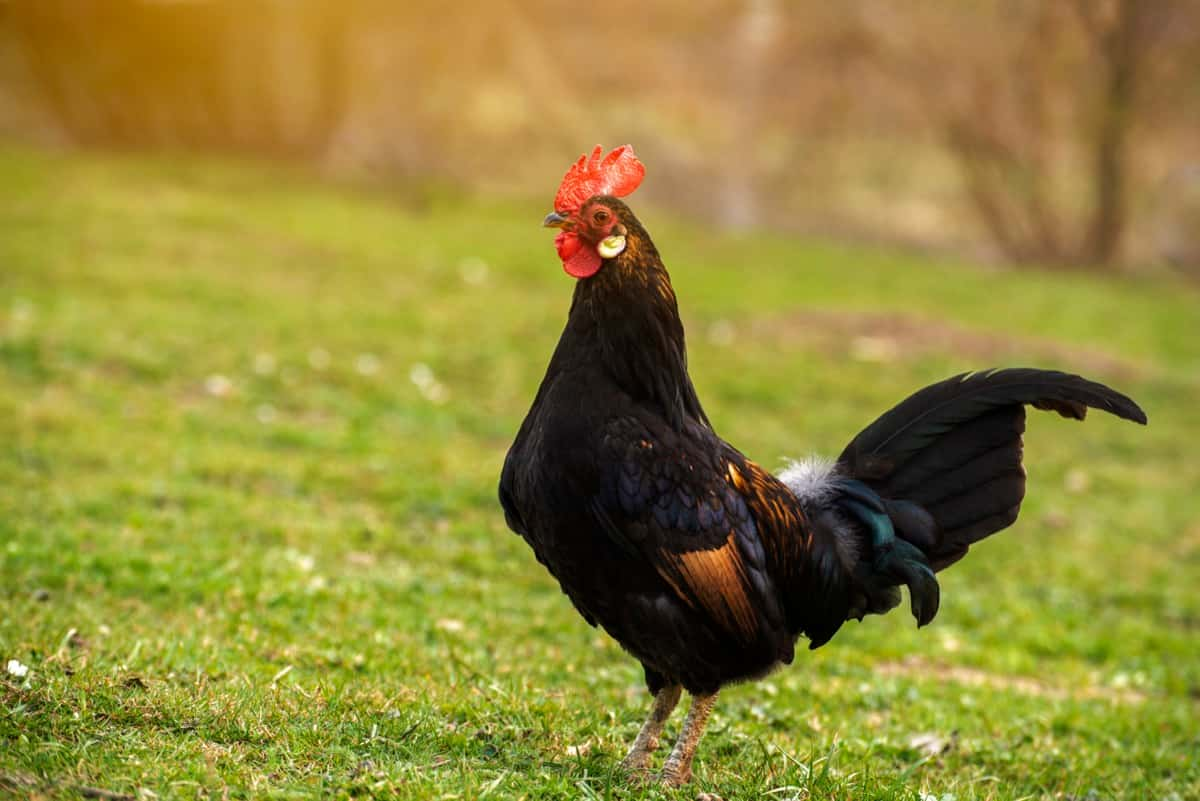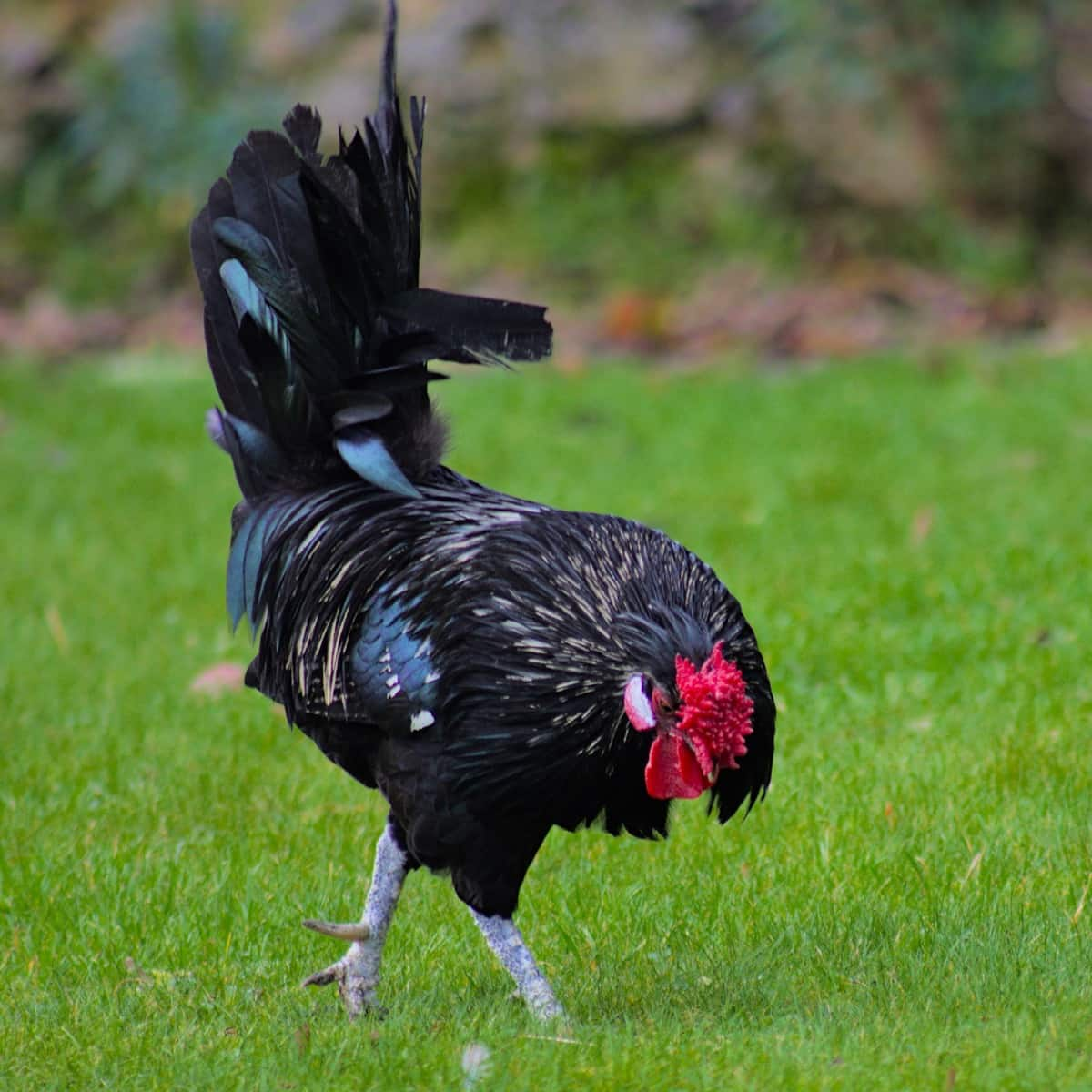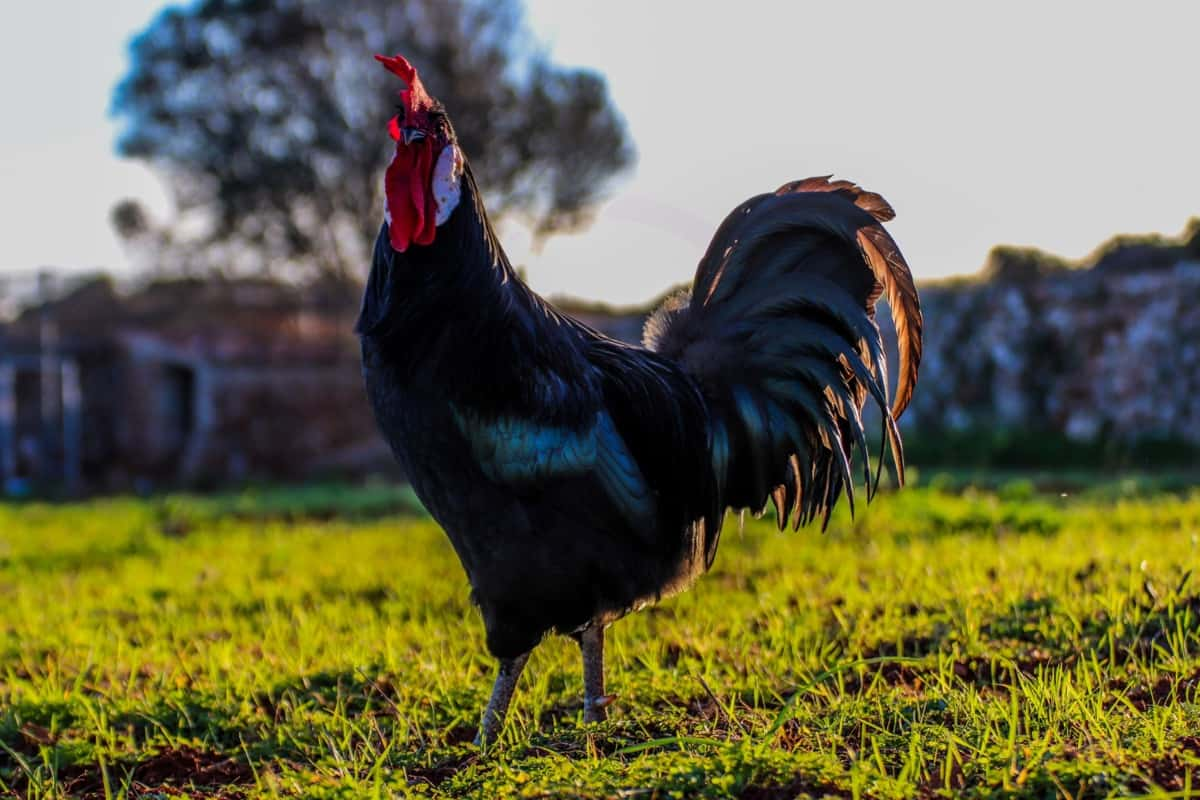The Minorca chicken is known for its exceptional egg-laying capabilities, making it a popular choice among poultry farmers and backyard chicken enthusiasts. These chickens are highly productive and lay many white eggs throughout the year.

Minorca Chicken Facts
Minorca Chicken Origin
The Minorca chicken is a beautiful, heavy layer from the island of Minorca, off the coast of Spain. It was once found in large numbers on this island, often roaming free and foraging. However, they have seen decreasing numbers recently, finding themselves on the watchlist for extinction.
The exact history of the Minorca chicken is unknown, but several theories circulate. One history claims that this large fowl originated in Africa with the Moors. As such, it was often called the “Moorish fowl.” However, some believe this breed came from Italy with the Romans. One thing is for certain; the Minorca chicken is a descendant of the old Castilian fowl, sharing many of its traits.
Minorca Chicken Appearance
- Among the many Mediterranean breeds like Leghorns, Andalusians, Anconas, and many more, the Minorcas are considered one of the largest.
- They weigh between 3 to 4.5 kg. However, despite their large size, they have a more narrow angular build.
- The Minorcas also have long tails and black feathers with a greenish glow when lit by the sun.
- Minorca chicken skin color is white, and the legs are black or dark slate-colored. Black Minorca egg color is white.
- Furthermore, they have red faces, combs, and wattles, which is why they are sometimes referred to as Red-faced black chickens.
- However, their most distinctive feature is their large white earlobes, appearing on both hens and roosters but much larger on the roosters.
- They are among the very few breeds of chickens with white earlobes.
Minorca Chicken Egg Laying
- Minorcas of today have lower egg production than their ancestors, but they are still considered good layers.
- You can expect around 120 eggs per year from each Minorca hen. This average may be higher in warmer climates, reaching 220 eggs.
- One advantage of having Minorcas in your flock is that they begin laying earlier than other breeds. You may start to see eggs from about 16 weeks on.
- But there are also those that take a little longer to reach maturity, laying from 24 weeks or more.
- Minorca’s hens reach maturity a little older than most other breeds, and you’ll find Minorca’s hens start laying from 22 – 26 weeks old. This can even be longer if they reach this age during the colder months of winter. However, from 30 weeks old, you can expect your Minorca hens to be laying consistently.
- Minorcas may not lay eggs all year round, but they make up for the lack of production in the size of their eggs. These white, hearty eggs often weigh an impressive 65 grams each once the hens reach 57 weeks of age.
Minorca Chicken Broodiness
One important aspect to consider when raising Minorca chickens is their broodiness. Broodiness refers to a hen’s instinct to sit on and incubate a clutch of eggs until they hatch. Unlike some other chicken breeds, Minorca chickens are not particularly prone to broodiness. They are known for their low broodiness tendencies. Minorca hens are less likely to exhibit brooding behavior than breeds such as Silkies or Orpingtons.
In case you missed it: Discover the Top 10 Best Chicken Breeds for Gardens: Companions for Urban Homesteading

If you have a Minorca hen exhibiting broodiness, monitoring her closely and providing the necessary support is essential. This may involve providing eggs to incubate and ensuring she has a safe and comfortable space to carry out her brooding duties. It is important to provide a suitable environment for broody hens to ensure their comfort and the successful hatching of eggs. This includes providing a quiet and secluded nesting area and ensuring the broody hen can access food and water without leaving the nest for extended periods.
Minorca chicken Hardiness
The Minorca chicken is a highly resilient breed that withstands various environmental conditions. They have a strong immune system and can resist common poultry diseases. Their Hardiness allows them to thrive in both hot and cold climates, making them suitable for various geographical locations. Additionally, white Minorcas are known for their ability to forage and find food even in challenging conditions, reducing the need for constant supplementation.
One reason for the Hardiness of Minorcas is their unique physical characteristics. They have a single comb, which allows for better heat dissipation during hot weather. This helps the Minorca chickens regulate their body temperature and prevents overheating. Additionally, their large, strong bodies provide the necessary insulation to withstand colder temperatures.
Black Minorca Chicken Free Range
The free-range aspect of Black Minorca chickens is particularly important for their health and welfare. When allowed to roam freely, they can engage in natural behaviors like foraging for food, bathing dust, and socializing with other chickens. These activities contribute to their physical and mental well-being, leading to healthier and happier chickens.
Furthermore, the free-range lifestyle of Black Minorca chickens positively impacts the quality of their meat and eggs. These chickens can consume a diverse diet, including insects, seeds, and grass. This varied diet translates into tastier and more nutritious eggs and meat.
Minorca Chicken Personality and Temperament
Long-held as a farm favorite, the Minorca chicken is friendly, alert, and curious. They are known for their fondness for human company, though they do not require your attention. Because they are so calm and friendly, the Minorca chicken is a great pet for children and a good choice for first-time showers. They are perfectly happy in confinement or free-ranging, though they can sometimes wander off while exploring. In confinement, these birds remain calm and don’t make a big fuss.
In case you missed it: 10 Best Chicken Breeds For Producing Large Brown Eggs

Due to their size, they can hold their own against more aggressive birds but aren’t known to be bullies themselves. The Minorca breed is a fine forager, which helps cut down on the cost of feed. However, they are large birds and will need to eat a lot. If your foraging ground isn’t large enough, you will need to supplement with significant amounts to help the hens keep up with their prolific egg-laying.
Conclusion
Minorca chickens are an old, trusted breed of great egg producers. They are a friendly breed with a long history all over the world. Sweet-natured, curious, and easy to care for, this regal breed is a beautiful addition to any flock, collection, or farm.
- Feed Your Flock for Less: Top 10 Tips to Save on Chicken Feed
- Ultimate Guide to Ossabaw Island Hog: Breeding, Raising, Diet, and Care
- Hatching Answers: The Top 10 Reasons Your Chickens Aren’t Laying Eggs
- Eggs and Economics: Breaking Down the Cost of Raising Backyard Chickens
- Defend Your Greens: Proven Methods to Keep Iguanas Out of Your Garden
- Ultimate Guide to Cinnamon Queen Chicken: A Comprehensive Guide for Beginners
- Ultimate Guide to California Tan Chicken: Breeding, Raising, Diet, Egg-Production and Care
- Ultimate Guide to Marsh Daisy Chicken: Breeding, Raising, Diet, and Care
- 10 Types of Chicken Farming Businesses You Can Start for Profits